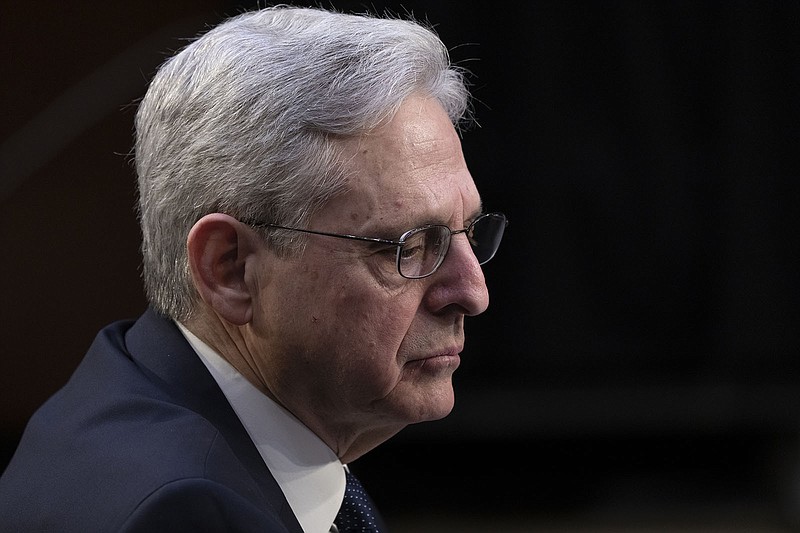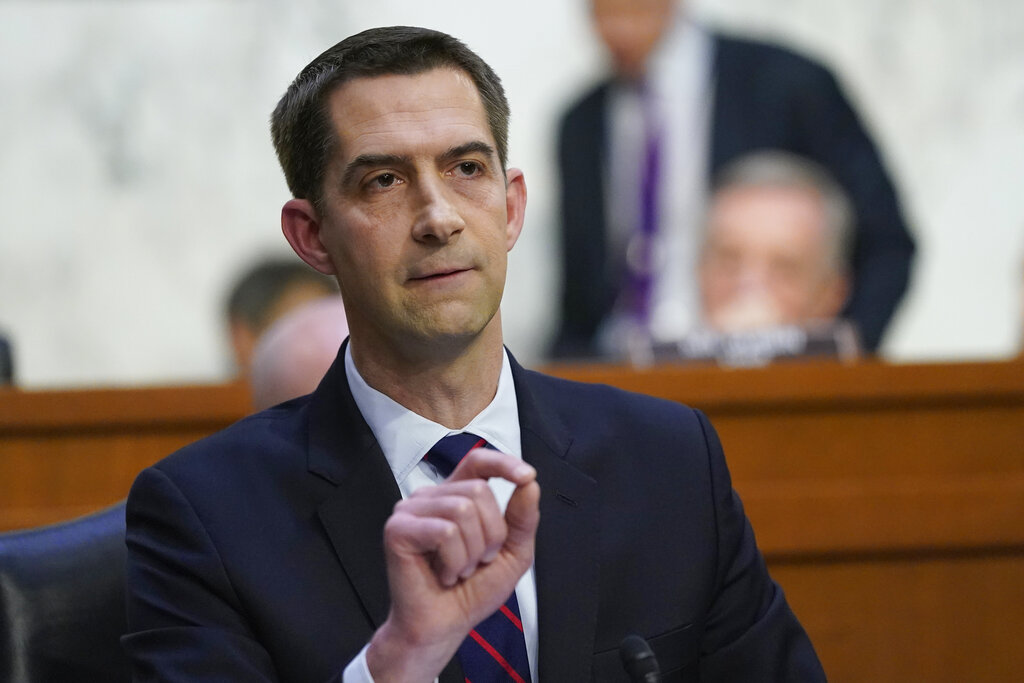WASHINGTON -- U.S. Sen. Tom Cotton, R-Ark., grilled Attorney General Merrick Garland on Wednesday over the Biden administration's asylum policies and other Justice Department decisions, including actions affecting federal prosecutors.
Garland appeared before the Senate Judiciary Committee to explain the Justice Department's operations. The attorney general faced questions from lawmakers regarding multiple issues, including fentanyl and the related rise in overdose deaths.
Cotton was among the Republicans who used the hearing to rebuke Garland, who has served as attorney general since March 2021.
The Little Rock senator questioned Garland over the Justice Department's decision to end a Trump administration policy concerning people seeking asylum in the United States. Garland vacated the rule limiting asylum for individuals seeking protection from domestic and gang violence.
"This was based on threats specifically to individuals, on gangs where the country was unable to protect the person," Garland told Cotton. "It wasn't about violence in general."
Cotton argued the Justice Department is failing to address domestic violent crime, citing American cities with higher crime rates than countries whose citizens could be affected by the asylum policy.
"Is the United States government and the city governments of St. Louis and Baltimore and New Orleans unwilling and unable to protect its own citizens?" Cotton asked.
"I don't believe they are unwilling," Garland responded. "They are doing everything that they can. We're supporting them in every way that they can. The examples [of nations] that you're talking about are examples where they are unwilling to protect from gangs."
Cotton challenged Garland over a December 2022 memorandum regarding charges and sentencing. The directive -- which references the agency's established Principles of Federal Prosecution -- emphasizes the importance of seeking prosecution in cases with admissible evidence, but prosecutors must additionally consider if sentencing would have an outcome "proportional to the seriousness of the defendant's conduct" and provide sufficient punishment and public protection.
"I have gotten numerous, numerous contacts in my office from your prosecutors who are shocked that you overturned this decades-long bipartisan standard," Cotton said.
Garland said the memorandum does not direct prosecutors to not seek a case.
"I'm well aware of the standard because I helped write the standard originally," the attorney general said before Cotton interjected.
"Because it was a Carter administration standard," the senator said. "Not specifically known for being tough on crime."
"Well, it was the first time the Principles of Prosecution were reduced to a book, which explained what they were. It was included in it," Garland said. "No one is being directed to not do anything."
Cotton took exception to the memorandum's language on mandatory minimum sentences. The directive states related provisions have "often caused unwarranted disproportionality in sentencing and disproportionately severe sentences."
Garland said there are exceptions for drug trafficking and violent crimes, adding to Texas Sen. John Cornyn the directive is tied to resource allocation.
"These include our investigators and how much we have to investigate to establish requirements for mandatory minimums, the prosecutors who have to prove those cases, the judges who have to try those cases, and the jails that have to hold those individuals for longer terms," Garland told Cotton.
"The memorandum was crystal clear that they are to charge the most serious provable offense in cases involving violent crime and drug trafficking."
The third subject of Cotton's questioning involved how the Justice Department handled protests outside of Supreme Court justices' homes. The demonstrations stemmed from a draft Supreme Court opinion leaked last May stating an end to the national right to abortion. Justices issued a similar opinion last June, triggering additional protests outside of these residences and a wave of marches.
Garland said U.S. marshals at the protests opted not to arrest protesters.
"Marshals are law enforcement officials, not prosecutors," Cotton said.
"These people were not criminal masterminds," the senator said. "They posted videos of themselves on their social media accounts. They advertised the protests in advance. It is possible to arrest someone for an offense after an offense has occurred, is it not?"
Garland said the Justice Department allocates its resources toward protecting justices and their families.
"Mr. Attorney General, do you not think that it would perhaps provide a deterrent effect if you arrested some of these criminal protesters and charged them and threw them in federal prison?" Cotton asked.
"We are trying to protect the lives of the justices. That is our principal priority," Garland said. "I'm leaving it to the Marshal Service to make determinations on the ground. They have to make determinations about what they see on the ground."
Cotton quizzed Garland about not directing department efforts toward investigating the protesters. The senator compared the inaction to the Justice Department's efforts related to the Jan. 6 insurrection at the U.S. Capitol; agents continue to investigate the riot, in which supporters of former President Donald Trump stopped the certification of the 2020 presidential election.
"I think the answer is that you are sympathetic to the protesters. That you didn't like the decision that the justices were about to issue," the senator said. "I think we all know what you would do if a bunch of conservative protesters were outside the home of a Democratic-appointed justice to the Supreme Court."
"No one has been arrested under that statute under those circumstances," Garland replied.
Garland's appearance happened amid special counsel investigations regarding classified documents found at the residences and offices of Trump and President Joe Biden. Garland defended the decision to appoint special counsels in both cases, noting the campaign ambitions of both men.


